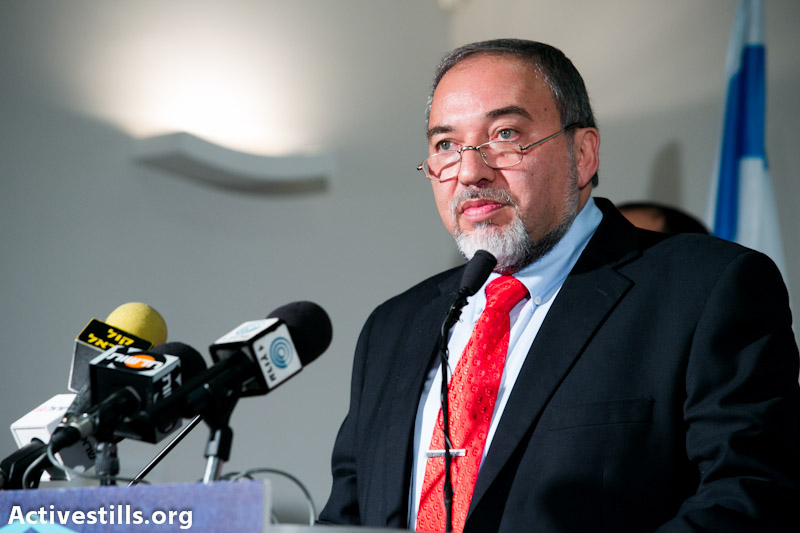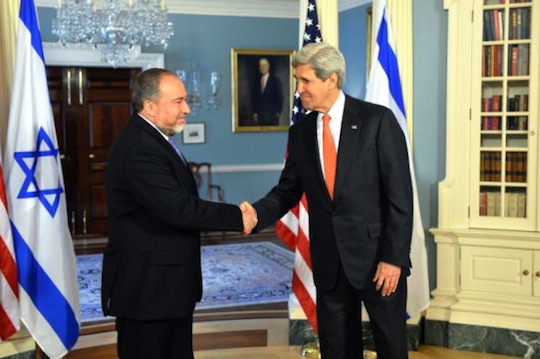Without a distinct ideology or the support of Israel’s ultra-right, the days of Liberman dominating political headlines may soon be over.
By Aaron Magid
On the night of the 2009 election as Avidgor Liberman’s party jumped to unprecedented power with 15 seats, the popular Israeli satirical show “Eretz Nehederet” depicted Liberman ominously. Both Benjamin Netanyahu and Tzipi Livni huddled around Liberman begging for his support while Liberman surrounded by black clad bodyguards shot at Netanyahu’s foot to grab his attention. “The elections were a marvelous experience and they were also a final experience. There will be no more elections,” Liberman declared with the audience cheers at his command. Although fictitious, this prime-time episode of the most influential comedy show highlighted Liberman’s influence within Israeli society. Nonetheless, in the next Eretz Nehederet election night show, Liberman will have a much smaller role. The rise of Naftali Bennett replacing Liberman as the leader of the far-right, declining influence of Russian identity politics, and lack of unique security platform will likely lead to the downfall of Liberman in the next elections.
Liberman’s rise to power rested on his outspoken support of Israel’s national honor. When addressing Arab-Israeli members of Knesset who supported the Palestinian cause, he called for their execution. A combination of Liberman’s charisma and defense of Israel’s security interests propelled him to become the leader of Israel’s far right.
Yet, Bennett’s explosion into the political scene has seized Liberman’s spotlight among hawkish voters. Housing Minister Uri Ariel and the Jewish Home party are largely responsible for a 123% increase in West Bank settlements this past year. Last week, Channel 2 invited Bennett onto its main broadcast to discuss his threatening ultimatum that he will leave the government if Netanyahu releases any Arab-Israeli prisoners. With Bennet’s own charisma, the party’s deep support among settlers, and the charm of a young and charming Ayelet Shaked, Liberman will have little chance of maintaining the title of Netanyahu’s main rival from the right wing.
Even Liberman has noticed Bennet’s rise and has adapted accordingly. While some politicians attacked Secretary John Kerry for his perceived bias when conducting negotiations, Liberman rushed to his defense declaring, “John Kerry is a true friend of Israel.” Liberman added that he was willing to give up land in a peace deal- an idea reviled by settlers and Jewish Home supporters. Accordingly, many pundits rushed to characterize Liberman as a moderate.
Nonetheless, Liberman has a far way from trying to win over centrist’s voters even discounting his stances before the perceived shift. After an increase in rocket attacks in March, Liberman called for the “full reoccupation of Gaza.” A few weeks ago, he blasted EU Foreign Policy Chief Catherine Ashton in a sarcastic Facebook post claiming that she does not understand the world’s problems. Furthermore, he has persisted in his plan to transfer land of Israel-Arabs to a Palestinian state – an idea rejected by the overwhelming majority of the international community. Would a centrist Israeli, someone who voted for Yair Lapid in the previous election, really trust Liberman with the country’s security and diplomatic challenges given his off-the-cuff criticisms of foreign officials, racist remarks about Israel’s Arab citizens and erratic policy changes?
If Liberman is unable to gain support from centrist voters or Jewish Home party supporters, he could theoretically takeover Likud from within. However, this appears improbable. Politically savvy, Benjamin Netanyahu has now completed his eighth year as Prime Minister. When asked which candidate would be most fitting to serve as Prime Minister, a recent poll shows that Netanyahu received four times the amount of votes compared to any potential opponent with Liberman only scoring 2%. Even if Netanyahu would somehow lose support within the party, Liberman would face other stiff competition. In a March 2014 Channel 2 poll, Minister of Defense Moshe Ya’alon (Likud) received the highest ratings for his job performance out of all other government ministers. It is important to remember that Liberman only attained the rank of a corporal in his military service and did not accumulate security expertise during his brief stint in the army – a trait highly valued among Israeli voters. Yaalon’s popularity along with his strong security credentials after serving as chief of staff will make it nearly impossible for Liberman to emerge head of Likud.
Liberman’s future political challenges will also be related to the declining identity of Russian-Israelis as a distinct electoral bloc. Al-Monitor’s Ben Caspit explains “the heyday of Yisrael Beitenu as a party for newly arrived Russian immigrants is gone. The massive wave of immigration from Russia has been integrated in the country.” After living over 20 years in Israel, the younger generation often views itself as more Israeli than Russian so loyalties to Liberman and Russian based parties have dropped. Given this demographic change, Liberman must reach out to different political camps in order to maintain political prominence. Yet, with the settlers allying with Bennett and security hawks impressed by Ya’alon, and realists staying with Netanyahu, there is little room left for Liberman.
Some have argued that Liberman’s supposed turn to the center and his stronger relationship with Secretary Kerry will improve his electoral chances. Yet, no candidate has better ties with the West than Tzipi Livni and current polls show that her party is treading water barely above the new higher electoral threshold for entering the Knesset.
Most importantly, Liberman has not effectively reached out to Israeli voters. For all his zigzagging in recent months, an April 11 Haaretz poll shows that Israelis on average are more dissatisfied than approve of Liberman’s performance as Foreign Minister. Additionally, with Israelis increasingly concerned about socio-economic issues and ballooning housing prices, Liberman is not seen as a leader on social justice matters – a fact that will likely hurt his electoral chances.
In a visit to New York last month, Liberman addressed a Russian-speaking crowd saying that soon Israel “may have a Russian-speaking Prime Minister.” Although it is unclear if Liberman was referring to himself, his upcoming political troubles make this seem highly unlikely. Without a distinct ideology and losing the support of Israel’s ultra-right, the days of Liberman dominating political headlines and telecasts of Eretz Nehederet may soon be over.
Aaron Magid is a graduate student at Harvard University specializing in Middle Eastern Studies. He has written articles on Middle Eastern politics for The New Republic, Al-Monitor and Lebanon’s Daily Star. He tweets at @AaronMagid.
Read more:
Coming attraction: Liberman the peacenik
WATCH: Will Liberman become Israel’s next prime minister?
Liberman: Citizenship annulment is a condition for peace


